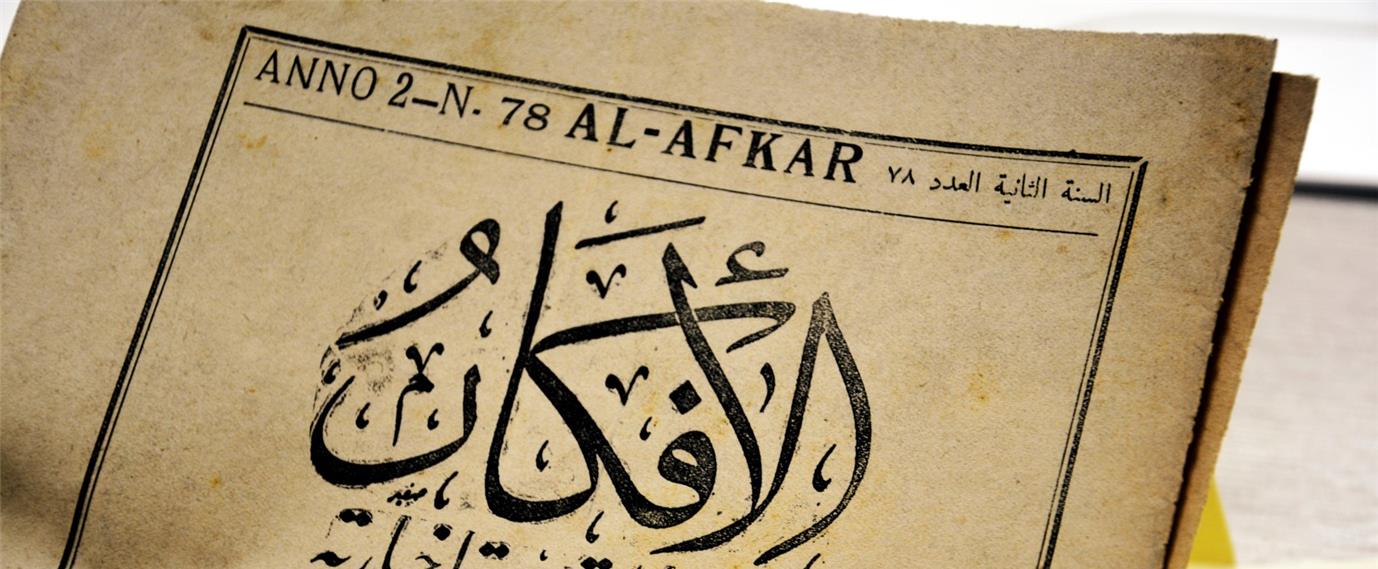تحتضن ولاية ساو باولو البرازيلية أرشيفاً مهمّا غير مكتشف بعدُ للصحف العربية، وهو واحد من عدّة أرشيفات مهملة، تحاول بعض الجهات الاتحادية والمحلية على مستوى الولاية إعادة ترتيبها وترميمها. وأهمية هذه الأرشيفات ليست في قِدمها فقط، بل أيضا في تسليطها الضوء على عدة مراحل من تاريخ المشرق العربي، وتاريخ العرب في البرازيل وكيفية تفاعلهم مع قضايا المنطقة.
و البرازيل دولة شابّة لا يتجاوز عمرها الـ470 عاما، وهي -كباقي دول القارة الأميركية- دولة هجرة، فيها من كل الأجناس والأعراق الذين جاؤوا ليستوطنوها. يحوي "الأرشيف العام في ولاية ساو باولو" -وهو هيئة رسمية تتبع حكومة الولاية- عددا كبيرا من الصحف الناطقة بعدة لغات، أسّسها المهاجرون الأوائل، فكانت صلة وصل بين هذا الجيل والجيل الذي تلاه وبين بلدانهم الأصلية، إلى أن فقد الجيل الثالث لغة آبائه وأجداده واندمج في المجتمع البرازيلي الهجين، إضافة إلى عوامل أخرى حديثة، كتطور وسائل ال ا تصال والإنترنت والفضائيات في العقدين الأخيرين.
كانت الصحف العربية قد اندثرت باستثناء بعض المحاولات لتأسيس صحف حزبية عَمِل على إصدارها ناشطون عرب بالتعاون مع بعض الناشطين البرازيليين، كصحيفة "البيان" الناطقة باللغتين العربية والبرتغالية، والتي صدر منها بضعة أعداد عام 2007، إلا أنّها اضطرت للتوقف في نفس العام لصعوبات عديدة.. مالية وتقنية.
أُسِّس أرشيف ساو باولو عام 1892، بينما أنشئ القسم العربي فيه عام 1985، إلا أن توسعته وبدء عملية تطويره وأتمتة محتوياته لتصبح في متناول الجميع على شبكة الإنترنت؛ لم تبدأ إلا منذ العام 2012، أي بعد تخصيص مبنى مستقل لهذا الغرض.
قسم كبير من محتويات هذا الأرشيف كانت محفوظة بشكل سيّئ في معهد التاريخ والجغرافيا، حيث بدأ العفن وقلة الاهتمام يفتكان بهذا الإرث التاريخي الكبير. وبمبادرة من بعض موظفي أرشيف الولاية، تمّ سحب هذه الكميات وحفظها.
كانت صحيفة "لبنان" التي صدرت عام 1891، أول صحيفة عربية تصدر في البرازيل ويضمّها أرشيف ساو باولو، مما يشير إلى أن العرب كانوا من المؤسّسين الأوائل، ليس للصحافة وحسب، بل للبلاد بشكل عام، وعلى كافة المستويات السياسية والاجتماعية والاقتصادية والثقافية.
كانت المملكة البرتغالية قد احتلَّت البرازيل عام 1500، أي بعد سقوط الأندلس بثمانية أعوام (1492)، وعملت على نشر ثقافتها المشبعة بالثقافة العربية في البلاد الجديدة، إلا أن هذا مرّ بمراحل عديدة معقدة.
وبحلول العام 1808، تأسّست أول صحيفة برازيلية "بريد البرازيل" ( Correio Braziliense )، لكن في لندن، لأن مؤسّسها "هيبوليتو خوسيه داكوستا" ( Hip ó lito José da Costa ) معارض لحكم الملك "جواو السادس" ( Jo ã o 6 ) الذي نقل مركز حكمه إلى البرازيل عام 1808، خوفا من أطماع نابليون بونابرت في شبه الجزيرة الإيبيرية، إلا أن حكمه لم يستمر بعد هذا طويلاً، حيث نالت البرازيل استقلالها عن البرتغال عام 1822، لتنتعش الصحافة فيما بعد وتنطلق العديد من الصحف، لكن من داخل البرازيل هذه المرّة.
كانت فترة خروج العرب من الأندلس واحتلال البرتغال وإسبانيا لأميركا اللاتينية بعدها بسنوات قليلة، ثم خضوع العالم العربي للحكم العثماني منذ العام 1516، فترة المتغيرات الديمغرافية والثقافية الكبرى، حيث بدأت الهجرات من أوروبا وآسيا وإفريقيا باتجاه العالم الجديد.
وهكذا كان العرب -وقد سبقتهم ثقافتهم- من المؤسّسين الأوائل. يشهد على ذلك عدد كبير من الصحف المطبوعة في ولاية ساو باولو في القرن التاسع عشر، كصحيفة "الأصمعي" التي صدر أول أعدادها في بدايات العام 1898، ثم كرّت السُّبحة لتصدر "الأفكار" و"المُناظر" و"الوطن" و"المنارة" و"الميزان" و"الحديقة"، وغيرها الكثير. هذا في ساو باولو، وهذا ما يحتفظ به أرشيفها.
لكن العاملين بهذا الأرشيف مثل "ليجيا فايتروني" المساعِدة الإدارية في مكتب التدريب التقني في المحفوظات العامة، وزميلها "خوسيه روبرتو" يؤكدان أن "أرشيف الصحف العربية المحفوظ في ريو دي جانيرو هو الأكبر والأضخم"، ربّما لأن هذه الولاية كانت حتى وقت قريب عاصمة البرازيل. تقول فايتروني إن هذا الأرشيف يشكِّل جزءا مهمّا من ذاكرة البرازيل وتاريخها، وإنهم ما زالوا يستقبلون الصحف القديمة الصادرة في البرازيل من المتبرّعين، حيث يعملون على أرشفتها وإضافتها إلى المحفوظات، إلا أنهم يعانون من مشكلة الترجمة، حيث تحتاج محتويات الأرشيف إلى جهد جبّار لفرزها حسب تاريخ ومكان صدورها.
يحتوي الأرشيف أيضا على عدد من الصحف العربية التي كانت تصدر خارج البرازيل كصحيفة "لسان العرب" التي كانت تصدر في الإسكندرية قبل عام 1895، و"لبنان" التي بدأت بالصدور منذ عام 1891، و"لسان الحال" أيضا من بيروت، وقد صدرت لأكثر من ثلاثين عاما، حيث يعود تاريخ بعض الأعداد المحفوظة في الأرشيف إلى العام 1896، إضافة إلى صحيفة "كوكب أميركا" التي كانت تصدر من نيويورك، وتوزّع في عدّة بلدان، منها الولايات البرازيلية منذ عام 1895.
بهذا المعنى، فقد ترافق صدور الصحف العربية في البرازيل مع صدور أقدم الصحف البرازيلية، لكن في زمن سياسي وتاريخي مختلف عن الزمن الحاضر، حيث كان العالم العربي يرزح تحت حكم احتلالات متعدّدة، وهي توثّق وتؤرّخ لمراحل أصبح من الضروري العودة إليها لدراستها وغربلة ما شابها من تحريف وتزوير في مراحل لاحقة كثيرة بما يتوافق وأمزجة الأنظمة الحاكمة في العالم العربي، لأن كثافة صدور هذه الصحف في الخارج وتنوّعها يؤشّران على أن مساحة الحرية تحت حكم الاحتلال كانت ضيقة، وأن صدورها في الخارج ضَمِن لها استقلالية وموضوعية تؤهلانها لأن تكون مرجعا تاريخيا يؤخذ بعين الاعتبار.
المزيد من الصور لصحف عربية في أرشيف الصحف بمدينة ساو باولو (تصوير: ليتيسيا سي)














































